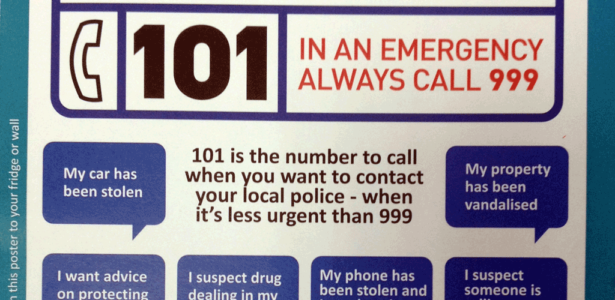101 – Improving customer service

That central telephone contact number brings with it both good and bad. Everyone knows 999, which is part of the national psyche, with the 101 number not far behind. Two easy to remember, practical and simple ways to get in touch with the police when you need them.
There are downsides to these upsides however. The ease with which people can contact the police, and the different things we need of our police, has sent the number of calls through the roof.
In recent months, my team has received numerous complaints about the 101 service, and unfortunately people are not concerned without reason. Slowly, but significantly, the number of calls coming into the police’s control room has risen, the calls are more complex and on average take longer. The result? A more personal service when you get through, but longer waiting times, which people are quite rightly cross about.
I take these concerns very seriously, as does the Chief Constable. In North Yorkshire, we are demanding of our police force, and have high expectations of the service. Rightly so. But notwithstanding the professionalism and commitment of the team in the control room, many people’s expectations not being met at present.
The first step to putting the problem right is to understand what’s wrong and a lot of work is being done to improve the service. I have made it clear to the Chief Constable that 101 should be a top priority, and I know he understands the importance we all place on this invaluable service.
Clearly there are issues which are out of our control, such as the surge in demand for both 101 and 999, which is being felt across the country and not just here in North Yorkshire. There is also little we can do to parts of the automated service, which is a national system.
But there is a lot the police can do locally, are doing and will continue to do. The three central planks to the improvement plan are staffing, technology and training.
There is no instant fix however, so we shouldn’t expect improvements overnight. Instead, planned recruitments of 17 new staff in October 17 and a further 20 in January will give the police more capacity to take calls. The new Q-buster feature means they can now call you back when it’s particularly busy, and the feedback is good, so if you are offered this service, please do take it up. Instead of hanging on the phone, the police will call you back as soon as possible, normally within about five minutes. The training programme is also being streamlined, and a huge swathe of administration is being taken away from the team so they can concentrate on taking calls. All in all, I hope to see waiting times start to come down soon.
In the meantime, the 101 service remains a standing item on my monthly performance meetings, which anyone can watch live online or catch up on via my website.
And despite the very significant challenges facing the 101 number, I am pleased to say the 999 service has remained pretty consistent, and all in all, pretty good. Waiting times remain at about 10 seconds, which is up slightly but manageable, and the police are still deploying officers quickly and effectively.
We also need people to do their bit. Unfortunately, calls are made to 999, which are not genuine emergencies. So please think a moment before picking up the phone. The police are not here to help give directions to hotels, they cannot take bins out because you forgot, nor do they need to know a sparrow has just flown into a kitchen window, and yes, 14.00 is the same as four o’clock. These are not made up, and are all calls that have come into the control room.
The control room is the police’s hub for managing their response to the public on a minute by minute basis, and we need to make that as easy as possible. As well as to fix the problems, both for the public and also the staff. The team in the control room work under real pressure, providing a professional and calm service in sometimes extraordinary circumstances, so I’d like to take this moment to thank them and to reassure everyone that there is light at the end of the tunnel and things are on track to improve.
